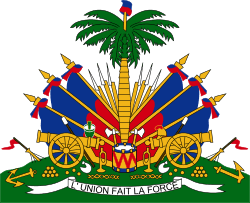History of Haiti (1915–86)
Part of a series on the |
|---|
| History of Haiti |
 |
| Chronology |
|
| Topics |
|
|
United States occupation
In 1915, Philippe Sudré Dartiguenave was appointed by US authorities to the Presidency of Haiti. Martial law was declared, and persisted until 1929. A treaty, which allowed the US government complete control over cabinet positions and Haiti's finances, was passed by the legislature in November 1915. The treaty also established the Gendarmerie d'Haïti (Haitian Constabulatory Force), Haiti's first professional military. Dartiguenave dissolved the legislature in 1917 after its members refused to approve a new constitution. A referendum subsequently approved the constitution, which allowed foreigners to own land, something which had been forbidden by Haitian law since independence in 1804.
The US occupation was a costly period in terms of human life. A revolt by disgruntled citizens was put down in 1918, with an estimated 2,000 killed. White foreigners, many with deep racial prejudices, dominated public policy, which angered the historically dominant Mulattos. However, Haiti's infrastructure, including roads, telephone lines, and plumbing, were repaired. Lighthouses, schools, hospitals, and harbors were built. Louis Borno replaced Dartiguenave as president in 1922, after he was forced out of office. He ruled without a legislature until elections were permitted in 1930. This newly formed legislature elected Sténio Vincent, a mulatto, as president.
By 1930, Haiti had become a liability to the United States. A congressional inquiry, known as the Forbes Commission, exposed many human rights violations, and while it praised improvements in Haitian society, it criticized the exclusion of Haitians from positions of authority. By August 1932, with the election of Franklin D. Roosevelt as US President, American troops withdrew and authority was formally transferred to local police and army officials.
1935–56
Vincent took advantage of the stability to gain dictatorial power. Vincent expanded his economic authority by referendum, and in 1935, he forced a new constitution through the legislature. This constitution gave him power to dissolve the legislature and reorganize the judiciary at will, as well as the power to appoint senators. He also brutally oppressed political opposition. Rafael Leónidas Trujillo came to power in 1930 in the neighboring Dominican Republic, and in 1937, he attacked the border with Haiti, killing an estimated 20,000 Haitians. Seen by Vincent as an attempted coup, he purged the military of all officers suspected of disloyalty. Many of these later joined the Dominican military.
In 1941, Élie Lescot, a mulatto who was an experienced and competent government official, was elected as President. Despite high expectations, his tenure paralleled Vincent's in its brutality and marginalization of opposition. He declared war on the Axis powers during World War II, and used this as an excuse to censor the press and repress his opponents. Lescot also maintained a clandestine cooperation with Trujillo, which undermined his already-nonexistent popularity. In January 1946, after Lescot jailed editors of a Marxist newspaper, protests broke out among government workers, teachers, and business owners. Lescot resigned, and a military junta, the Comité Exécutif Militaire (Executive Military Committee), assumed power.
Haiti elected a legislature in May 1946, and after two rounds of voting, Dumarsais Estimé, a black cabinet minister, was elected president. He operated under a new constitution which expanded schools, established rural farming cooperatives, and raised salaries of civil servants. These early successes, however, were undermined by his personal ambition, and his alienation of the military and elite led to a coup in 1950, which reinstalled the military junta. Direct elections, the first in Haiti's history, were held in October 1950, and Paul Magloire, an elite black Colonel in the military, was elected. Hurricane Hazel hit the island in 1954, which devastated the nation's infrastructure and economy. Hurricane relief was inadequately distributed and misspent, and Magloire jailed opponents and shut down newspapers. After refusing to step down after his term ended, a general strike shut down Port-au-Prince's economy, and Magloire fled, leaving the government in a state of chaos. When elections were finally organized, François Duvalier, a rural doctor, was elected, on a platform of activism on behalf of Haiti's poor.